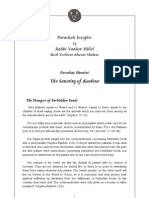Shavuot - The Journey Is The Destination
Shavuot - The Journey Is The Destination
Uploaded by
Ari Ayelet YablokCopyright:
Available Formats
Shavuot - The Journey Is The Destination
Shavuot - The Journey Is The Destination
Uploaded by
Ari Ayelet YablokOriginal Title
Copyright
Available Formats
Share this document
Did you find this document useful?
Is this content inappropriate?
Copyright:
Available Formats
Shavuot - The Journey Is The Destination
Shavuot - The Journey Is The Destination
Uploaded by
Ari Ayelet YablokCopyright:
Available Formats
Shavuot: The Journey is the Destination
Chag HaShavuot named after the weeks leading up to it. Seems
counterintuitive.
-
Passuk never mentions the 6th of Sivan only the 50th day of the Omer.
Gm says Shavuot can be 5th 6th or 7th or sivan why not one day?
Q Why is Shavuot based on the days leading up to it and not on a set date?
Q - Why name something after the preparation we do leading up to it?
A The idea seems to be that the holiness and special nature of the day is
defined by the preparation that goes into it. The result of this is that attention
is taken away from the destination, Shavuot itself, and focus is put more on the
journey. This doesnt make sense if you think about it. Why is this so?
Q2 Is there anywhere else that we see an example of this?
1. Torah
A. Mitzvah of Talmud Torah Vishinantam Livanecha not for the sake
of having the Torah, but for teaching it to the next generation. Seems
similar to the idea of Shavuot not about the individual
accomplishment of acquiring Torah, but more about the ability to
transmit it onwards.
B. Torah Tziva Lanu Moshe, Morasha kehilat Yaakov Yerusha = an
inheritance, Morasha = an heritage, meant to be passed on.
[Rabbeinu Bachayay, Parshas Vaeira]
C. Chofetz Chaim Parshat Bechukotai Anu Ameilim Vheim AmeilimWe get reward for the effort, not the accomplishment. Same idea.
2. Shabbat
Yom Shekulo Shabbat Umenucha Is Shabbat a day to rest in order to
get back to work [6 days are the ikar], or is Shabbat the destination all
along [Sof Maaseh Bmachshavah Techilah]? [Or HaChaim Hakadosh on
the passuk Ki Sheshet Yamim asah Hashem] Seems like both
3. Olam Hazeh
A. Pirkei Avot Olam Hazeh = pruzdur (hallway), Olam Haba = Traklin
[palace ballroom]. Olam Hazeh itself is a journey, while Olam Habah is
the destination. Yet the Torah makes no mention of Olam Habah
anywhere! Another example of the Journey being the focus rather
than the destination.
B. Mesilat Yesharim Sheadam lo nivrah elah lhitaneig al Hashem
the only place to do this is in Olam Haba, but the only place to merit
this is Olam Hazeh its all about Olam Hazeh.
4. Tefilah
Kavanah = reminds Hashem of our sins, also get reward in this world
and the next! How so? Two types of Kavanah 1. To get prayers
answered, 2. To focus on the words and the present moment.
Seems like proper Tefilah is to immerse yourself in the experience of
being with God and not the results of the experience (prayers
answered).
5. Pesach and Sukkot
A. Pesach Vhigadita LiVincha all about the kids. Questions but no
answers = journey > destination.
B. Sukkos Rav S.R. Hirsch Vihayita Ach Sameach not being
happy but being in a state of happiness. Sfat Emet Shivat Yamim
Bashanah Sukkot teaches us to rejoice during the other weeks of
the year. Shmini Atzeret no specific mitzvot, no destinations just
be with Me today.
Conclusion:
Shavuot has no mitzvat hayom. There is nothing to do on Shavuot. Exactly. You
dont do anything you rejoice in the every day experience of being with God by
living with His Torah. No wonder it also has the name atzeres the end of the
Period between Pesach and Shavuos, but also, a chance to stop to just be.
To enjoy the journey and to understand that in reality, the journey is the
destination.
You might also like
- Roadmap To Jewish LearningDocument1 pageRoadmap To Jewish LearningAri Ayelet Yablok100% (1)
- Gutnick-Steinmetz - Elul 1, 5774 - Yechidus of Rebbe With R. Chaim GutnickDocument36 pagesGutnick-Steinmetz - Elul 1, 5774 - Yechidus of Rebbe With R. Chaim GutnickYehudah DovBer ZirkindNo ratings yet
- Parashat Vayechi 5773 PDFDocument2 pagesParashat Vayechi 5773 PDFyudifeldNo ratings yet
- Ohev Yisroel by Opter Rav Avraham Yehoshua Heschel of Apt, MezibuzDocument13 pagesOhev Yisroel by Opter Rav Avraham Yehoshua Heschel of Apt, Mezibuztalmoshe613No ratings yet
- Sabini - Goffman - Self PresentationDocument13 pagesSabini - Goffman - Self PresentationAri Ayelet YablokNo ratings yet
- First Fruits Bible Study: The Basic Concept: A Backyard AnalogyDocument4 pagesFirst Fruits Bible Study: The Basic Concept: A Backyard AnalogyWale Ogunniran100% (1)
- UntitledDocument16 pagesUntitledoutdash2No ratings yet
- R Shoff On Chumash - Weekly Sheet - Parshas Bereshis 2023Document20 pagesR Shoff On Chumash - Weekly Sheet - Parshas Bereshis 2023Elchanan ShoffNo ratings yet
- Psalms of Zion: Sol LiptzjnDocument50 pagesPsalms of Zion: Sol LiptzjnCarlos Mayre NascimentoNo ratings yet
- 1 - Yesodei HaTorahDocument55 pages1 - Yesodei HaTorahAvi HoffmanNo ratings yet
- Measurement of GOD's BODYDocument8 pagesMeasurement of GOD's BODYAllanCuartaNo ratings yet
- Baruch She 'Amar Teaching Guide: by Torah Umesorah Chaim and Chaya Baila Wolf Brooklyn Teacher CenterDocument10 pagesBaruch She 'Amar Teaching Guide: by Torah Umesorah Chaim and Chaya Baila Wolf Brooklyn Teacher CenterMárcio de Carvalho100% (1)
- PekudeiDocument7 pagesPekudeiDavid MathewsNo ratings yet
- Torah Wellsprings - Vayikra 5781 A4Document16 pagesTorah Wellsprings - Vayikra 5781 A4Commar CommarNo ratings yet
- Torah 101-Pinchus Portion I. Answers To Last Week'S Study Questions (From Balak)Document5 pagesTorah 101-Pinchus Portion I. Answers To Last Week'S Study Questions (From Balak)api-204785694No ratings yet
- Daf Ditty Pesachim 118: Hallel Ha-GadolDocument32 pagesDaf Ditty Pesachim 118: Hallel Ha-GadolJulian Ungar-SargonNo ratings yet
- Beis Moshiach #621Document37 pagesBeis Moshiach #621Boruch Brandon MerkurNo ratings yet
- Vayechi - "And He Lived": Seventeen YearsDocument6 pagesVayechi - "And He Lived": Seventeen YearsDavid MathewsNo ratings yet
- The Impact of MitzvotDocument8 pagesThe Impact of MitzvotHarav Michael Elkohen100% (2)
- Details Count: Parashat Naso Sivan 12 5774 May 30, 2015 Vol. 24 No. 32Document4 pagesDetails Count: Parashat Naso Sivan 12 5774 May 30, 2015 Vol. 24 No. 32outdash2No ratings yet
- Counting The Omer 2022Document56 pagesCounting The Omer 2022Roberto Rheinlander RebelloNo ratings yet
- Chumash Detail DevarimDocument216 pagesChumash Detail Devarimdavid mejijaNo ratings yet
- Aseret HaDibrot PDFDocument14 pagesAseret HaDibrot PDFAnonymous h8VHmcxczJNo ratings yet
- Rav Kook Torah: Tetzaveh: The High Priest's Clothes and The ConvertDocument7 pagesRav Kook Torah: Tetzaveh: The High Priest's Clothes and The ConvertLeandroMaiaNo ratings yet
- Parashat EmorDocument5 pagesParashat EmorHarav Michael ElkohenNo ratings yet
- Day-by-Day Halachic Guide: Detailed Instructions On The Laws and Customs For The Month of Tishrei 5775Document18 pagesDay-by-Day Halachic Guide: Detailed Instructions On The Laws and Customs For The Month of Tishrei 5775Chabad Info EnglishNo ratings yet
- Torah 101-Vayakhel Parsha I. Answers To Study Questions (Ki-Tissa)Document4 pagesTorah 101-Vayakhel Parsha I. Answers To Study Questions (Ki-Tissa)api-204785694No ratings yet
- Nitzavim VayelechDocument2 pagesNitzavim VayelechLivingTorah100% (1)
- Roadmap To Prayer Lesson 34Document21 pagesRoadmap To Prayer Lesson 34Krisztian KelemenNo ratings yet
- Responding To Words, Responding To Blows: Parashah Insights Rabbi Yaakov HillelDocument4 pagesResponding To Words, Responding To Blows: Parashah Insights Rabbi Yaakov HillelHarav Michael ElkohenNo ratings yet
- Baal HaSulam - 6 - Talmud Eser Sefirot (Book of The 10 Spheres) - Histaklut Pnimit - Free Kabbalah PDFDocument35 pagesBaal HaSulam - 6 - Talmud Eser Sefirot (Book of The 10 Spheres) - Histaklut Pnimit - Free Kabbalah PDFwroueaweNo ratings yet
- Tishrei Part One 5777 EnglDocument60 pagesTishrei Part One 5777 EnglanherusanNo ratings yet
- Walking As A Sacred Duty New VersionDocument29 pagesWalking As A Sacred Duty New VersionElliot WolfsonNo ratings yet
- Zman Matan Torah:: Our Name Is Yosef, Not JoeDocument4 pagesZman Matan Torah:: Our Name Is Yosef, Not Joeoutdash2No ratings yet
- Parshas Toldos-EnglishDocument26 pagesParshas Toldos-EnglishHarav Michael ElkohenNo ratings yet
- NullDocument16 pagesNullapi-26093179No ratings yet
- Shemot - NamesDocument6 pagesShemot - NamesDavid MathewsNo ratings yet
- From Theosophy To Midrash Lurianic Exege PDFDocument39 pagesFrom Theosophy To Midrash Lurianic Exege PDFJohnNo ratings yet
- VayechiDocument7 pagesVayechiDavid MathewsNo ratings yet
- Yitro - Jethro: ( Remember This)Document5 pagesYitro - Jethro: ( Remember This)David MathewsNo ratings yet
- The Sanctity Of: Parashah Insights Rabbi Yaakov HillelDocument8 pagesThe Sanctity Of: Parashah Insights Rabbi Yaakov HillelHarav Michael ElkohenNo ratings yet
- Shir Shel YomDocument2 pagesShir Shel YomBrad HoffmanNo ratings yet
- VayetzeDocument2 pagesVayetzeLivingTorahNo ratings yet
- GUIDE 1:71 Introduction To The KalāmDocument15 pagesGUIDE 1:71 Introduction To The KalāmאלברטורודריגסNo ratings yet
- Full JournalDocument42 pagesFull Journalreuvan1195No ratings yet
- Parshat Bechukosai - B'Atzeret Al Peirot Ha'IlanDocument2 pagesParshat Bechukosai - B'Atzeret Al Peirot Ha'Ilanoutdash2No ratings yet
- Mishpatim - Selections From Rabbi Baruch EpsteinDocument3 pagesMishpatim - Selections From Rabbi Baruch EpsteinRabbi Benyomin HoffmanNo ratings yet
- Parashah Insights Rabbi Yaakov Hillel: Trust in HashemDocument6 pagesParashah Insights Rabbi Yaakov Hillel: Trust in HashemHarav Michael ElkohenNo ratings yet
- Full The Jewish Book of Days A Companion For All Seasons 1st Edition Hammer PHD Ebook All ChaptersDocument84 pagesFull The Jewish Book of Days A Companion For All Seasons 1st Edition Hammer PHD Ebook All Chaptersjalesnichi100% (19)
- List of Documents For The MoadimDocument1 pageList of Documents For The MoadimRabbi Benyomin HoffmanNo ratings yet
- Tetzaveh - KookDocument6 pagesTetzaveh - KookLeandroMaiaNo ratings yet
- Featured Articles Weekly ColumnsDocument40 pagesFeatured Articles Weekly ColumnsB. MerkurNo ratings yet
- Pinchas 2008Document2 pagesPinchas 2008api-3811809100% (1)
- Parshas Vayishlach EnglishDocument14 pagesParshas Vayishlach EnglishHarav Michael ElkohenNo ratings yet
- The Philosophy of Rav Kook - IBC - JTH 2481H - Yosef BronsteinDocument155 pagesThe Philosophy of Rav Kook - IBC - JTH 2481H - Yosef BronsteinrewewrwerweNo ratings yet
- Shaarei Teshuvah - en - Sefaria 2020 Edition, Translated by R. Francis NatafDocument88 pagesShaarei Teshuvah - en - Sefaria 2020 Edition, Translated by R. Francis NatafRaziel Ben AvrahamNo ratings yet
- Parshas Pinchas EnglishDocument25 pagesParshas Pinchas EnglishHarav Michael Elkohen100% (3)
- Toldos Selections From Rabbi Baruch EpsteinDocument3 pagesToldos Selections From Rabbi Baruch EpsteinRabbi Benyomin Hoffman100% (1)
- Rava's GolemDocument9 pagesRava's GolemChris CosentinoNo ratings yet
- The Sanctity of The Whole: Parashah Insights Rabbi Yaakov HillelDocument8 pagesThe Sanctity of The Whole: Parashah Insights Rabbi Yaakov HillelHarav Michael ElkohenNo ratings yet
- Love - SternbergDocument10 pagesLove - SternbergAri Ayelet YablokNo ratings yet
- History of Hasidism - David AssafDocument35 pagesHistory of Hasidism - David AssafAri Ayelet Yablok100% (2)
- Non-Kosher Animals & ToysDocument10 pagesNon-Kosher Animals & ToysRabbi Benyomin HoffmanNo ratings yet
- Ezra Restoration and ReformationDocument10 pagesEzra Restoration and ReformationshaqtimNo ratings yet
- Trump, Putin, and ChabadDocument13 pagesTrump, Putin, and ChabadA.J. MacDonald, Jr.50% (4)
- General Manifestations of African ReligiosityDocument14 pagesGeneral Manifestations of African ReligiosityAVONDENNo ratings yet
- Why Is It Called A SederDocument11 pagesWhy Is It Called A SederxmntrlrNo ratings yet
- Newsletter May 2011Document5 pagesNewsletter May 2011shasdafNo ratings yet
- Answer To Study Questions From Last Week (Noach)Document29 pagesAnswer To Study Questions From Last Week (Noach)api-204785694No ratings yet
- The Bible As Islamic ScriptureDocument27 pagesThe Bible As Islamic ScriptureMoinullah KhanNo ratings yet
- Article - From New York To Vermont Conversation With Steve Reich - KimDocument22 pagesArticle - From New York To Vermont Conversation With Steve Reich - Kimpeter_learn100% (1)
- Hebrews PresentationDocument33 pagesHebrews Presentationjesurun001exodus3410No ratings yet
- I Just Want To Drink My Tea: Mrs. Leah NagarpowersDocument2 pagesI Just Want To Drink My Tea: Mrs. Leah Nagarpowersoutdash2No ratings yet
- Kami Export - The HolocaustDocument1 pageKami Export - The HolocaustmelanaitorNo ratings yet
- JBQ 393 Hammurabi Scribd3Document7 pagesJBQ 393 Hammurabi Scribd3Peggy Bracken StagnoNo ratings yet
- Interpreting The Last Supper Sacrifice, Spiritualization, and Anti-Sacrifice PDFDocument17 pagesInterpreting The Last Supper Sacrifice, Spiritualization, and Anti-Sacrifice PDFmsrencaNo ratings yet
- Hindu-Jewish Summit InformationDocument26 pagesHindu-Jewish Summit Informationamneo9No ratings yet
- Vayishlach, וַיִּשְׁלַחDocument6 pagesVayishlach, וַיִּשְׁלַחDavid MathewsNo ratings yet
- Nesta Webster - Secret Societies and Subversive MovementsDocument62 pagesNesta Webster - Secret Societies and Subversive MovementscannonfireNo ratings yet
- Danon, Jakov - Memoars On Holocaust of The Jews From Bosanska KrajinaDocument578 pagesDanon, Jakov - Memoars On Holocaust of The Jews From Bosanska KrajinaGrigorijeNo ratings yet
- David Berger - Persecution, Polemic, and Dialogue - Essays in Jewish-Christian Relations-Academic Studies Press (2010)Document446 pagesDavid Berger - Persecution, Polemic, and Dialogue - Essays in Jewish-Christian Relations-Academic Studies Press (2010)ChipsAndBeerNo ratings yet
- I Jewish Messiah Antichrist - PHPDocument18 pagesI Jewish Messiah Antichrist - PHPLililah Bint leyNo ratings yet
- Midrash As Narrative in The Middle AgesDocument28 pagesMidrash As Narrative in The Middle AgesGeorge CallanderNo ratings yet
- Tasuqilt D Lihala-Ines Di Tmazight Gar Yidelli D Wass-ADocument86 pagesTasuqilt D Lihala-Ines Di Tmazight Gar Yidelli D Wass-AMokrane ChikhiNo ratings yet
- 01b-Women and HalakhaDocument7 pages01b-Women and HalakhaFidel MorenoNo ratings yet
- Ephraim OshryDocument3 pagesEphraim Oshryerikjarvinen0No ratings yet
- Word Swastika Means "Good Fortune" or "Being Happy" in Sanskrit, and The Symbol Represents Good LuckDocument7 pagesWord Swastika Means "Good Fortune" or "Being Happy" in Sanskrit, and The Symbol Represents Good LuckVincent Bryan CruzNo ratings yet
- Dur FreeDocument234 pagesDur FreeJohn Mark MontanoNo ratings yet
- Bnai Brith and Israel The Unbroken Covenant PagesDocument26 pagesBnai Brith and Israel The Unbroken Covenant Pages1drees8mateus7No ratings yet
- BGLG 74 26 Shemini 5774Document40 pagesBGLG 74 26 Shemini 5774api-245650987No ratings yet





























































































